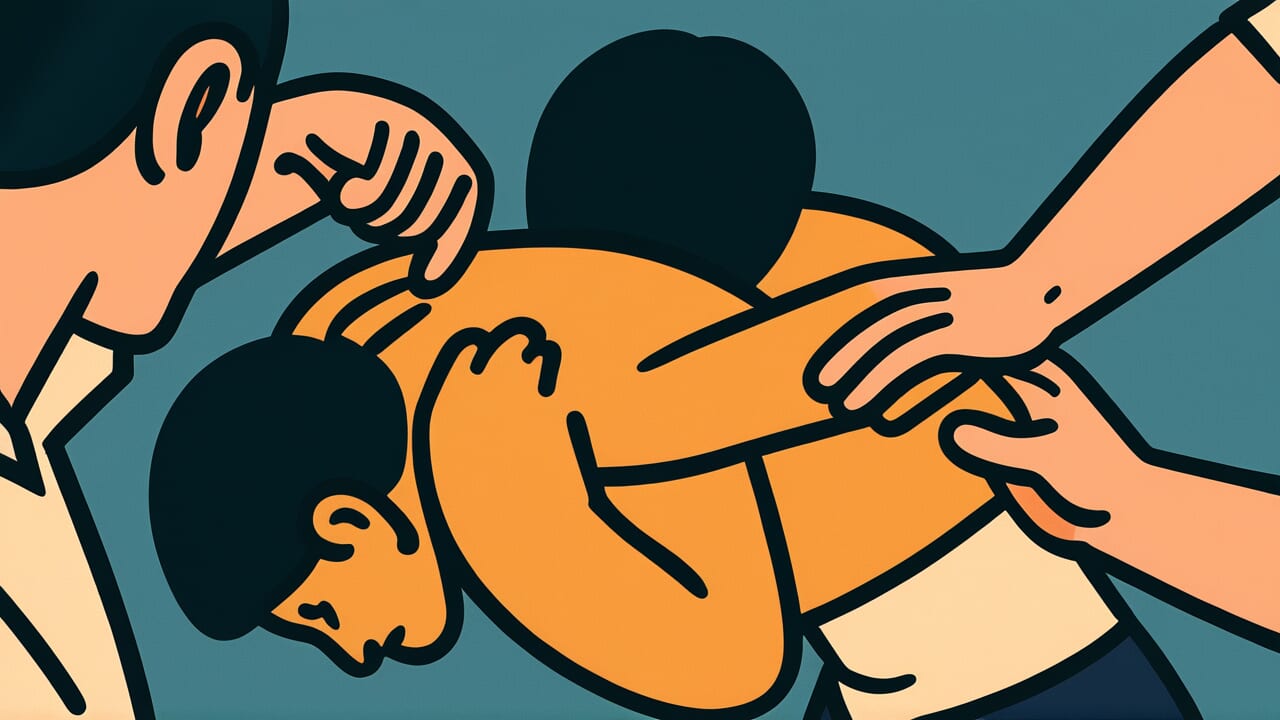How to Read “Taking the massage from the person who hits you”
Tataku hito no anma wo toru
Meaning of “Taking the massage from the person who hits you”
“Taking the massage from the person who hits you” is a proverb that criticizes excessive generosity. It describes someone who tries to repay kindness even to those who have harmed them.
This saying is used to criticize people who are too nice for their own good. It points out those who show kindness without considering whether the person deserves it.
Normally, you should return favors to those who help you. There’s no need to be kind to people who hurt you.
Yet some people do exactly that. This proverb suggests such behavior goes beyond virtue. It becomes foolish because you’re not taking care of yourself.
Even today, we see people who keep serving those who treat them unfairly. We see people who try to be kind even to those who hurt them.
Such actions might look beautiful on the surface. But this proverb asks an important question: “Is that really the right thing to do?”
It teaches us about maintaining proper distance. It reminds us of the importance of protecting ourselves.
Origin and Etymology
The exact origin of this proverb in written records is unclear. However, its structure suggests it comes from common people’s culture during the Edo period.
Let’s look at the phrase “taking the massage.” Massage was a familiar form of healing for common people in Edo-period Japan.
Having your tired body relaxed was a great blessing back then. So “taking the massage” meant providing someone with a pleasant service or showing them kindness.
Meanwhile, “hitting” literally means using violence or causing harm. By combining these two contrasting actions, the proverb creates a powerful irony.
Edo-period society valued balance in obligations and human relationships. People generally felt you should return favors when helped and respond appropriately when harmed.
In such a context, the extreme behavior of returning kindness even to those who harmed you became a target of laughter. It was seen as excessive generosity.
This proverb represents common people’s wisdom. It teaches the importance of having a balanced sense through humor.
Usage Examples
- He’s even helping with the work of someone who bullied him. That’s exactly like taking the massage from the person who hits you.
- She’s giving special service even to customers who made unreasonable complaints. This is what taking the massage from the person who hits you means.
Universal Wisdom
The proverb “Taking the massage from the person who hits you” teaches us a timeless truth. It’s about the importance of boundaries in human relationships.
Why do people try to be kind even to those who hurt them? Behind this lies a desire to be seen as a good person.
There’s also a compulsion to be fair to everyone. Fear of upsetting others might play a role too. So does anxiety about being seen as the bad guy.
Yet our ancestors mocked such behavior as “going too far.” They understood that indiscriminate kindness isn’t always a virtue.
They believed true maturity means having wisdom. You need to distinguish between those who deserve your kindness and those you should keep at a distance.
This proverb has been passed down through generations for a reason. Humans fundamentally want to be recognized and loved.
Because of these desires, we tend to sacrifice ourselves. In every era, some people couldn’t take care of themselves. And others worried about them.
“Being generous” and “treating yourself poorly” are different things. This proverb continues to convey the difficulty and importance of making this distinction. It does so through light, witty expression.
When AI Hears This
If someone hits you, hit back. If someone massages you, massage back. This proverb strikes at the core of game theory’s most successful strategy.
In the 1980s, political scientist Robert Axelrod invited researchers worldwide to submit programs for the “Prisoner’s Dilemma.”
Hundreds of complex strategies came in. But the winner was just four lines of code. It was called “Tit for Tat.”
The rules were simple. Cooperate on the first move. From the second move onward, simply copy what your opponent did last time. If betrayed, betray back. If they cooperate, cooperate back.
This strategy is strong for three reasons. First, “generosity” – it always starts with cooperation.
Second, “retaliation” – it immediately strikes back against betrayal. Third, “forgiveness” – it quickly forgives when the opponent returns to cooperation.
This combination produces the most benefit in long-term relationships.
What’s interesting is that this strategy never wins first place individually. It always ties with its opponent or loses slightly.
But when you look at the whole group, Tit for Tat strategies meeting each other keep cooperating. This maximizes overall benefit.
In other words, Edo-period Japanese people expressed a behavioral principle through physical metaphor. One that creates group stability rather than individual victory.
Lessons for Today
This proverb teaches modern people that “kindness needs direction.” Trying to be equally kind to everyone looks beautiful.
But you don’t need to show kindness to people who hurt you. That’s not virtue. It’s a vicious cycle of self-sacrifice.
Modern society brings more situations where we face unfair treatment. Online harassment and workplace bullying are examples.
In such times, some people try to be kind as a “mature response.” But this proverb asks a question. “Is that really helping you?”
What matters is having the courage to draw boundaries that protect you. Your kindness should go to people who deserve it.
Face unreasonable people with a firm attitude. Return kindness to those who value you. This balance is the key to building healthy relationships.
Before being kind to someone, be kind to yourself first. Your heart and time are limited.
Choosing to use them for truly important people is the wisdom this proverb conveys to modern times.



Comments